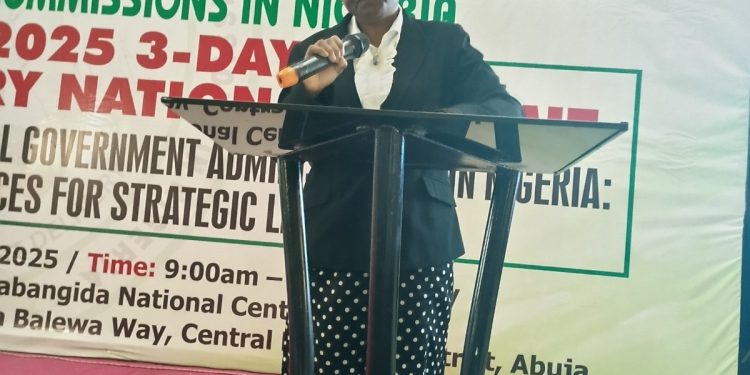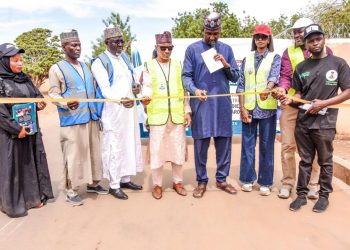By Nkechi Eze
The Chairman of the Independent Corrupt Practices and Other Related Offences Commission (ICPC), Dr. Musa Adamu Aliyu, SAN, has called for renewed commitment to integrity, transparency, and accountability in local governance, stressing that corruption in Nigeria is not limited to the theft of public funds but encompasses any deviation from due process or lawful conduct.
In an official statement signed by the Director, Public Enlightenment and Education of the Commission, Demola Bakare, Dr. Aliyu made the assertion in Abuja while delivering a paper titled “Understanding Anti-Corruption Laws and Their Implications for Local Government Officials” at the 2025 National Summit of the Association of Chairmen of Local Government Service Commissions in Nigeria.
The summit, held at the Maryam Babangida National Centre for Women Development, was themed “Strengthening Local Government Administration in Nigeria.” It brought together local government administrators, policymakers, and anti-corruption experts from across the country to explore reforms aimed at deepening accountability and improving service delivery at the grassroots level.
Represented by his Special Assistant on Legal Matters, Zainab Nass, the ICPC Chairman stated that corruption exists not only in government institutions but also in schools, markets, private organizations, and other sectors of society. He cited the World Bank’s definition of corruption as “the abuse of public office for private gain,” noting that corruption encompasses acts of greed, illegality, and deliberate violation of rules that deprive others of their rights.
“Corruption is not just about stealing money; it is anything that deviates from the rule. It is corruption not to follow due process,” Dr. Aliyu declared. He urged Nigerians at all levels to uphold honesty, fairness, and ethical conduct, emphasizing that national progress can only be achieved when both citizens and institutions act responsibly and in accordance with the law.
Reflecting on Nigeria’s historical efforts to combat corruption since independence, the ICPC Chairman recalled several past initiatives such as the Ethical Revolution, the War Against Indiscipline and Corruption (WAIC), and the Mass Mobilization for Self-Reliance, Social Justice and Economic Recovery (MAMSER). He explained that while these programmes raised public awareness, they failed to produce sustainable results due to the absence of legal frameworks and institutional continuity.
According to him, the establishment of the ICPC through the Corrupt Practices and Other Related Offences Act, 2000, marked a decisive turning point by providing the country with a comprehensive legal mechanism to investigate, prevent, and prosecute corruption cases. He outlined that the Commission’s mandate rests on three core pillars enforcement, prevention, and public education, and that these pillars have been effectively implemented through programmes such as Corruption Risk Assessments, Systems Studies and Reviews, and the creation of Anti-Corruption and Transparency Units (ACTUs) across Ministries, Departments, and Agencies (MDAs).
Dr. Aliyu also reaffirmed Nigeria’s commitment to international anti-corruption conventions and standards, including the United Nations Convention Against Corruption (UNCAC), the Financial Action Task Force (FATF) Standards, and the African Union Convention on Preventing and Combating Corruption (AUCPCC), which reinforce the country’s dedication to upholding integrity in governance.
Addressing the responsibilities of local government officials, the ICPC Chairman reminded them that public service is a public trust and that both elected and appointed officers are legally and morally obligated to demonstrate transparency and accountability in the discharge of their duties. He warned that administrative misconducts such as financial misappropriation, falsification of records, nepotism, and abuse of office now attract serious criminal consequences under Nigeria’s anti-corruption laws.
Dr. Aliyu also referenced the landmark 2024 Supreme Court judgment in Attorney-General of the Federation v. Attorneys-General of Abia State & 35 Others, which declared unconstitutional the dissolution of democratically elected local government councils by state governors. He described the ruling as “a new dawn for grassroots governance,” reaffirming the constitutional autonomy of local governments and their right to direct allocations from the Federation Account.
“We are now in the regime of asset recovery, taking back what was taken. Local governments must ensure that public funds serve the people, not private interests,” he stated.
Concluding his remarks, the ICPC Chairman called on all stakeholders in local governance to uphold the principles of integrity, probity, and effective service delivery. He stressed that true national development begins at the grassroots and depends on how efficiently local councils manage public resources to improve the welfare of citizens and promote inclusive growth across the nation.

















